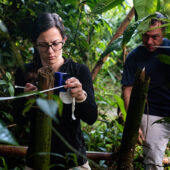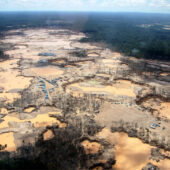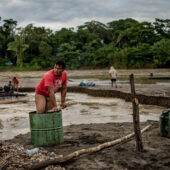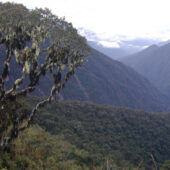USAID awards an additional $2.14 million to WFU rainforest research center
 Wake Forest University’s Center for Amazonian Scientific Innovation (CINCIA) has received $2.14 million in additional funding from the U.S. Agency for International Development (USAID), supporting the expansion of the research center’s study of mercury pollution and reforestation in the Peruvian Amazon.
Wake Forest University’s Center for Amazonian Scientific Innovation (CINCIA) has received $2.14 million in additional funding from the U.S. Agency for International Development (USAID), supporting the expansion of the research center’s study of mercury pollution and reforestation in the Peruvian Amazon.Categories: Awards & Recognition, Environment & Sustainability, Mentorship, Research & Discovery, University Announcements

 Gold jewelry on your holiday shopping list? Before you buy that special someone a statement piece this season, scientists studying climate change and the fate of the world’s vital rainforests ask you to consider some hidden consequences.
Gold jewelry on your holiday shopping list? Before you buy that special someone a statement piece this season, scientists studying climate change and the fate of the world’s vital rainforests ask you to consider some hidden consequences. Small-scale gold mining has destroyed more than 170,000 acres of primary rainforest in the Peruvian Amazon in the past five years, according to a new analysis by scientists at Wake Forest University’s Center for Amazonian Scientific Innovation (CINCIA).
Small-scale gold mining has destroyed more than 170,000 acres of primary rainforest in the Peruvian Amazon in the past five years, according to a new analysis by scientists at Wake Forest University’s Center for Amazonian Scientific Innovation (CINCIA). The WFU Awards and Recognitions briefs celebrate milestones of faculty, staff and students at Wake Forest.
The WFU Awards and Recognitions briefs celebrate milestones of faculty, staff and students at Wake Forest. Wake Forest University has earned a STARS Gold rating in recognition of its sustainability achievements from the Association for the Advancement of Sustainability in Higher Education (AASHE).
Wake Forest University has earned a STARS Gold rating in recognition of its sustainability achievements from the Association for the Advancement of Sustainability in Higher Education (AASHE). Wake Forest University will replace the light fixtures that shine on the University’s iconic Wait Chapel Bell Tower with new energy-efficient LED fixtures that will allow deeper and more vibrant colors for special events and other occasions.
Wake Forest University will replace the light fixtures that shine on the University’s iconic Wait Chapel Bell Tower with new energy-efficient LED fixtures that will allow deeper and more vibrant colors for special events and other occasions. Stan Meiburg, former acting deputy administrator of the Environmental Protection Agency (EPA) and now director of graduate programs in sustainability at Wake Forest, can discuss environmental hazards in the aftermath of Hurricane Florence.
Stan Meiburg, former acting deputy administrator of the Environmental Protection Agency (EPA) and now director of graduate programs in sustainability at Wake Forest, can discuss environmental hazards in the aftermath of Hurricane Florence. The Trump Administration is expected to announce a proposed replacement rule for the Clean Power Plan this week. Stan Meiburg, director of Wake Forest University’s graduate programs in sustainability, is available to discuss the expected rollback of regulations and the likely effects of the proposed changes.
The Trump Administration is expected to announce a proposed replacement rule for the Clean Power Plan this week. Stan Meiburg, director of Wake Forest University’s graduate programs in sustainability, is available to discuss the expected rollback of regulations and the likely effects of the proposed changes. Pope Francis’ visit to Peru on Jan. 15-22 takes him to the epicenter of the country’s informal and often illegal gold mining industry – the subject of groundbreaking environmental research by Wake Forest University scientists.
Pope Francis’ visit to Peru on Jan. 15-22 takes him to the epicenter of the country’s informal and often illegal gold mining industry – the subject of groundbreaking environmental research by Wake Forest University scientists. Hidden in plain sight – that’s how researchers describe their discovery of a new genus of large forest tree commonly found, yet previously scientifically unknown, in the tropical Andes. Researchers from the Smithsonian and Wake Forest University detailed their findings in a study just released the journal PhytoKeys.
Hidden in plain sight – that’s how researchers describe their discovery of a new genus of large forest tree commonly found, yet previously scientifically unknown, in the tropical Andes. Researchers from the Smithsonian and Wake Forest University detailed their findings in a study just released the journal PhytoKeys.